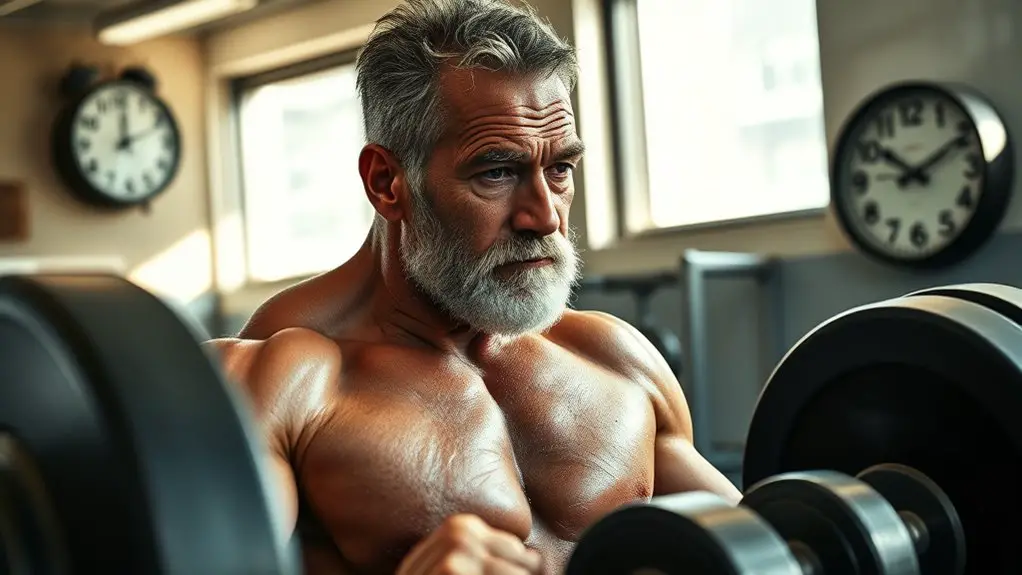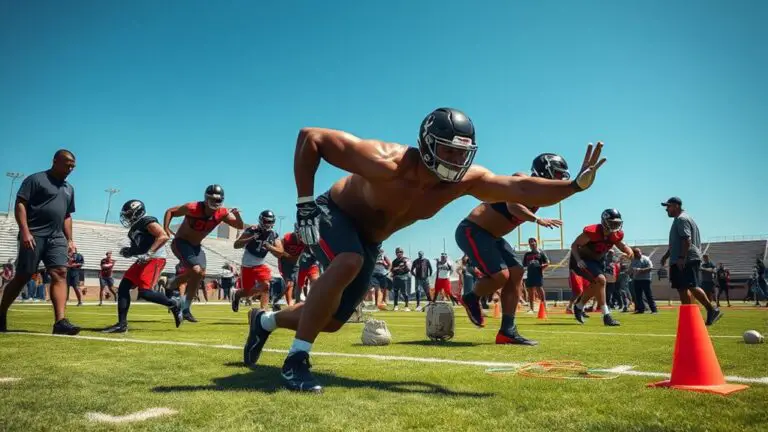How Aging Affects Muscle Growth and Gym Performance

As you age, muscle growth and gym performance decline due to hormonal changes and biological shifts. Hormones like testosterone decrease, leading to reduced muscle mass and strength. Protein synthesis slows, making recovery longer. Common challenges include a higher injury risk and motivation barriers. However, you can counteract these effects through strength training, proper nutrition, and a focus on safety. There’s much more to explore about maintaining muscle health as you age, so keep going.
The Biology of Muscle Growth and Aging

As you age, the biological processes that drive muscle growth begin to change, impacting your body’s ability to build and maintain muscle mass. One major change is the reduction in muscle fiber size and number, which can lead to decreased strength and endurance. Age-related changes in hormones, such as testosterone and growth hormone, also play a significant role in this decline. These hormones are essential for muscle repair and growth, and their levels naturally decrease over time. Additionally, your body’s ability to synthesize protein slows down, making it harder to recover from workouts. This doesn’t mean you can’t stay fit; incorporating strength training and a balanced diet rich in protein can help counteract these effects. By understanding these biological shifts, you can take proactive steps to support your muscle health as you age, ensuring you remain strong and active.
Common Challenges Faced by Older Adults in Fitness
While staying active is essential for maintaining health, older adults often face unique challenges that can hinder their fitness journey. One significant concern is injury prevention; as you age, your body may take longer to recover from strains or injuries. This can make you hesitant to push your limits, leading to decreased activity levels. Additionally, motivation barriers can arise due to physical limitations or fear of injury, making it hard to stick to a routine. You might find it difficult to maintain consistency or feel discouraged by slower progress. It’s important to listen to your body and adapt your workouts accordingly. Seeking guidance from fitness professionals can help you create a safe and effective exercise plan tailored to your needs. Remember, overcoming these challenges is possible with the right strategies and support, ensuring you stay active and enjoy the benefits of fitness throughout your life.
The Role of Hormones in Muscle Development

Staying active is important, but understanding how your body changes with age, especially regarding hormones, can help you navigate your fitness journey more effectively. As you age, hormonal fluctuations become more pronounced, impacting muscle development and overall performance. One key hormone, testosterone, naturally declines with age, which can lead to reduced muscle mass and strength. This decline isn’t something to fear, but it does mean you may need to adjust your training approach.
To counteract these hormonal changes, focus on strength training and incorporate exercises that promote muscle growth. Adequate rest and recovery are also vital, as they allow your body to adapt positively to your workouts. Additionally, consider consulting a healthcare professional to discuss safe strategies for maintaining hormonal balance. By being proactive and informed, you can continue to achieve your fitness goals while prioritizing safety and well-being.
Nutrition and Its Impact on Muscle Health
Understanding how nutrition impacts muscle health is paramount, especially as you age. Proper nutrition plays an important role in maintaining and promoting muscle growth. Prioritizing protein intake can greatly enhance protein synthesis, which is critical for muscle repair and development. Aim for high-quality sources like lean meats, dairy, and plant-based proteins.
Nutrient timing is also important. Consuming protein and carbohydrates around your workout can optimize muscle recovery and growth. It’s advantageous to have a balanced meal or snack within a couple of hours after exercising to support your body’s needs.
Don’t overlook the role of hydration and micronutrients; they’re fundamental for overall health and function. By focusing on a well-rounded diet, you can help guarantee your muscles stay strong and resilient as you age. Remember, smart nutrition choices can make a substantial difference in your gym performance and overall muscle health.
Effective Strategies for Maintaining Strength and Endurance

As you focus on nutrition to support muscle health, it’s equally important to implement effective strategies for maintaining strength and endurance as you age. Start with strength training at least two to three times a week. This helps preserve muscle mass, which naturally declines with age. Use weights or resistance bands, but make sure to prioritize proper form to avoid injury.
Incorporate endurance exercises, like walking, cycling, or swimming, into your routine. Aim for at least 150 minutes of moderate-intensity activity weekly. This not only boosts cardiovascular health but also enhances overall stamina.
Don’t forget to include flexibility and balance exercises, such as yoga or tai chi. These activities can improve your stability and reduce the risk of falls. Additionally, ensure that you respect personal limits to avoid burnout during your workouts. Finally, always listen to your body and consult a healthcare professional before starting any new exercise program. Safety should be your top priority in your fitness journey.
Frequently Asked Questions
How Does Aging Affect Recovery Time After Workouts?
As you age, you might notice that your recovery time after workouts extends. This can lead to increased muscle soreness, making it vital to adapt your recovery strategies. Incorporating proper hydration, balanced nutrition, and adequate sleep can help alleviate discomfort. Gentle stretching or low-impact activities can also aid recovery. Listening to your body and allowing yourself extra rest is essential to stay safe and maintain your fitness routine effectively.
Can Older Adults Safely Use Supplements for Muscle Growth?
Can older adults safely use supplements for muscle growth? Imagine boosting your workout results while ensuring safety. When paired with proper protein intake and resistance training, supplements can be beneficial. However, it’s vital to consult with a healthcare professional before starting any regimen. They’ll help you navigate the options that align with your health needs, ensuring you enhance your muscle growth while minimizing risks. Remember, safety always comes first!
What Exercises Should Be Avoided by Older Adults?
When considering exercises to avoid, you should steer clear of high-impact exercises like running or jumping, as they can increase the risk of injury. Instead, focus on low-impact activities that promote strength and flexibility. Incorporating balance training is essential, too, as it helps improve stability and prevent falls. Always listen to your body, and consult a fitness professional to guarantee you’re choosing safe exercises that align with your fitness level and goals.
How Does Aging Impact Flexibility and Range of Motion?
As the saying goes, “Use it or lose it.” Aging can lead to joint stiffness and reduced flexibility, which might affect your overall mobility. To counteract this, it’s crucial to incorporate mobility exercises into your routine. Gentle stretches and movements can help maintain your range of motion. Remember, prioritizing safety is key, so listen to your body and consult a professional if you’re unsure about which exercises are best for you.
Are There Age-Specific Fitness Classes Available for Seniors?
Yes, there are age-specific fitness classes available for seniors that focus on safety and well-being. You’ll find options like senior yoga, which helps improve flexibility and relaxation, and balance training, essential for maintaining stability and preventing falls. These classes are designed with your needs in mind, ensuring you can stay active in a supportive environment. Joining one can enhance your fitness while providing a sense of community with others in your age group.





